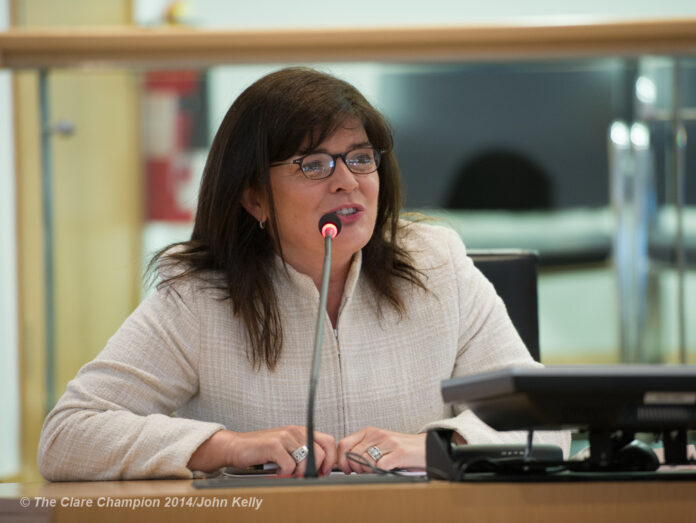IRISH Water has been accused of creating “a huge obstacle” to the development of rural Clare.
At a meeting of the council’s committee on Physical Development, frustration was aired at the fact that the authority is striving to protect water quality while Irish Water is unable to provide critical infrastructure in some locations.
Councillor Clare Colleran Molloy made her comments following a presentation from Ruairí Ó Conchúir of the Local Authority Waters Programme (LAWPRO).
Mr Ó Conchúir outlined the pressures on waterways across the Mid-West region, after which the Fianna Fáil member asked him if he believed there is a policy problem when it comes to funding waste water treatment.
Thanking Mr Ó Conchúir for his presentation, the Ennis member noted the recent criticism of Irish Water by the Environmental Protection Agency (EPA) over the discharge of raw sewage at a number of coastal locations.
“I want your opinion on this,” she said. “Do you think a different approach needs to be taken with funding of Irish Water?
“We are running into serious problems due to a lack of water treatment. This is an area that we need to address. Are we right to take the position we do in that we don’t pay for water?”
Councillor Colleran Molloy noted the concerns of local authority members over national strategy documents which have implications for the zoning status of unserviced lands.
“We have been trying to come up with a development plan to allow zoning of lands that won’t contaminate water,” she said.
“Irish Water is causing us a huge obstacle. Is there a policy problem when it comes to funding waste water treatment?”
Director of Service Carmel Kirby noted that work is being done to protect water quality.
“A huge amount of badly-needed work is being done to deal with issue of declining water quality,” she said.
“Government departments are examining policies relating to agriculture, fisheries, forestry and hydro-morphology. A lot of work is going on at national level to see what can change. Unless policies change, we’ll find it hard to improve water quality.”
She noted that Clare County Council and LAWPRO have identified ten priority areas.
“The local response will involve council staff working in those areas in accordance with the EPA,” she said. “Irish Water receives national investment albeit probably not enough. There are a number of untreated agglomerations and there is a capital programme committed to these.
“My own view is that water is our most precious and scarcest resource sand it’s really important that we do everything in our power to protect it.
“When we do have to pay, maybe we have greater regard. Certainly there does have to be greater investment, not just in wastewater but in the agriculture and forestry sectors.”
Senior Engineer, Environment and Water, Cyril Feeney also acknowledged the issue of raw sewage discharge.
“Clare County Council built a network which was taken over by Irish Water,” he outlined.
“Clare has five coastal towns with untreated agglomerations. Advanced works is already underway – for example in Liscannor and Kilrush – to treat the networks. In Clarecastle, some works are already completed, and more will be done by next year. Site selection is underway in Kilkee and Ballyvaughan. There are sensitive environmental issues in both locations. A lot of progress made, but it’s not going fast enough according to the EPA.”
“Significant investment is being made by Irish Water. Like everything, it all comes down to funding. Issues like that are governed by the Commission for Regulation of Utilities.
“Irish Water supports efforts to build a system in Broadford, but they didn’t have the funding. Unsewered towns and villages will be a challenge for us in the next County Development Plan as we try to grow the county.
“We must be mindful of our wonderful resources and avoid development for development’s sake. We must grow in a structured way. Irish Water is working through the process. When they receive funding, they do deliver.”
Responding to Councillor Colleran Molloy’s question, Mr Ó Conchúir said it was past time for investment in a water utility.
“I’ve been 20 years in Clare,” he said. “I worked in southern Africa for ten years. In terms of our understanding of water, we’re not at the races.
“The water that comes out of people’s taps is a fundamental right and a fundamentally precious resource. Of course people should pay for it. Until people pay for it, they don’t respect it.”
Mr Ó Conchúir also noted people’s own responsibilities in terms of water protection.
“More than three decades ago, that’s when investment was needed,” he said. “We have a lot of catching up to do. It’s not a great situation that there’s raw sewerage along the coast of.
“It’s not just funding. A lot of its to do with sites and Compulsory Purchase Orders (CPOs), It’s not all the doing of Irish Water. It’s also the doing of ourselves as local communities.”
Irish Water accused of throwing up roadblocks to development in Clare

online pharmacy neurontin with best prices today in the USA
